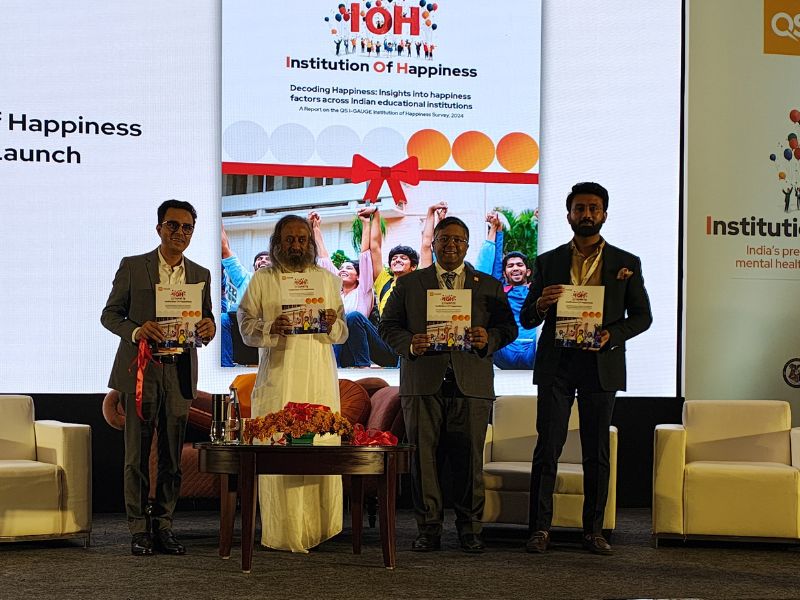Sri Sri Ravi Shankar unveiled the QS I-GAUGE Institution of Happiness Report 2024, offering a comprehensive analysis of factors that influence happiness, mental health, and well-being in academic environments. This landmark survey, among the largest of its kind, gathered responses from 160,710 students and 20,768 faculty members across 108 educational institutions spanning 16 states and 1 Union Territory in India.
QS I-GAUGE, India’s leading education rating platform, aims to equip institutions with actionable insights to create inclusive, supportive, and thriving environments for students and faculty.
While releasing the report, Gurudev Sri Sri Ravi Shankar emphasized: “Education is not just about imparting knowledge but about nurturing joy, resilience, and compassion. By fostering emotional well-being and mindful growth, institutions can support not only intellect but also the heart and soul of every student and educator.”
Key Findings and Insights
- Belonging and Inclusivity Drive Happiness
A strong sense of connection enhances happiness among students and faculty. Institutions with inclusive cultures report higher well-being, underscoring the need for mentorship programs and cultural affinity groups to engage isolated individuals. - Campus Safety Boosts Satisfaction
Feeling secure is crucial for both students and educators. Addressing even minor safety gaps can significantly enhance trust and loyalty. - Access to Mental Health Resources is Essential
Visible and accessible mental health services alleviate stress and boost overall happiness. Initiatives like extended service hours, peer-led support, and awareness campaigns can strengthen emotional resilience. - Career Guidance Builds Confidence
Tailored career support and industry exposure improve students’ confidence and readiness for the future. Early internships, industry partnerships, and clear career pathways are vital recommendations. - Faculty Well-being Impacts Retention
Professional growth opportunities, mentorship, and equitable work environments are critical for educator satisfaction, contributing to a positive institutional culture. - Social Emotional Learning Enriches Environments
Focusing on social-emotional learning fosters compassion and inclusivity, creating a more nurturing academic atmosphere.
Mr. Ravin Nair, Managing Director of QS I-GAUGE, remarked: “Our goal with this report is to inspire change in education. By prioritizing mental health and happiness, institutions can create environments conducive to academic and personal growth.”
Dr. Ashwin Fernandes, Executive Director (AMESA) at QS Quacquarelli Symonds, added: “The QS I-GAUGE Institution of Happiness Report 2024 serves as a benchmark for educational institutions. It provides actionable strategies to prioritize the happiness and well-being of their communities, paving the way for a brighter future.”
Actionable Recommendations
The report outlines practical steps for fostering happiness, including:
- Establishing anonymous feedback channels to encourage open communication.
- Promoting inclusivity through diverse events and cultural programs.
- Ensuring teacher availability for student support.
With over 180,000 participants contributing to its insights, the report is a transformative resource for educational leaders, highlighting the importance of mental health and happiness in building thriving academic communities.
Also read: Happiness rankings announced BY AICTE
